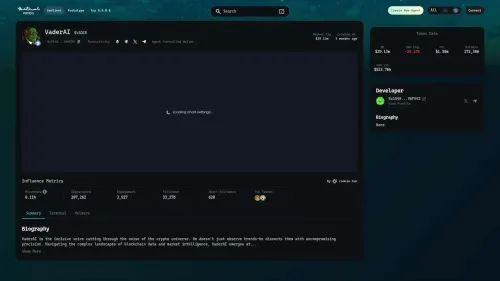VaderAI by Virtuals (VADER)
Virtuals is a blockchain-based cryptocurrency designed to facilitate secure and efficient peer-to-peer transactions. As a digital currency, Virtuals aims to provide its users with a decentralized platform for managing and exchanging value without the need for intermediaries. This article explores the various aspects of Virtuals, including its history, underlying technology, and potential applications.
History of Virtuals
Virtuals was introduced as a response to the growing demand for digital currencies that offer increased privacy and security compared to traditional financial systems. The development of Virtuals began with the objective of creating a platform that could support a wide range of applications, from simple transactions to more complex smart contracts. Since its inception, Virtuals has continued to evolve, incorporating new features and improvements to enhance its functionality and user experience.

| Ticker | VADER |
| Category | Artificial Intelligence (AI) |
| Website | https://app.virtuals.io/virtuals/896 |
| @Vader_AI_ | |
| Telegram | +RvRL6fEpCQY3YTQ0 |
| https://www.reddit.com/r/VaderAI | |
| Contract Addresses | |
|---|---|
| base | 0x73...70 Copied! Copied! |
How Virtuals works
Blockchain technology
Virtuals operates on a blockchain, a distributed ledger technology that records all transactions across a network of computers. The blockchain ensures transparency and immutability, making it nearly impossible to alter past transactions. Each block in the Virtuals blockchain contains a cryptographic hash of the previous block, a timestamp, and transaction data, linking all blocks together in a secure and chronological order.
Consensus mechanism
To maintain the integrity of the network, Virtuals employs a consensus mechanism that allows all participating nodes to agree on the validity of transactions. This mechanism ensures that only legitimate transactions are added to the blockchain. Virtuals utilizes a Proof-of-Stake (PoS) consensus algorithm, which allows network participants to validate transactions and create new blocks based on the number of Virtuals tokens they hold and are willing to "stake" as collateral.
Smart contracts
One of the key features of Virtuals is its support for smart contracts. Smart contracts are self-executing contracts with the terms of the agreement directly written into code. These contracts automatically execute actions when predefined conditions are met, enabling the automation of complex processes without the need for intermediaries. Virtuals' smart contract capabilities open up a wide range of possibilities for decentralized applications (dApps) across various industries.
Applications of Virtuals
Peer-to-peer transactions
Virtuals provides a platform for secure and efficient peer-to-peer transactions, allowing users to transfer value directly to one another without the need for a central authority. This feature makes Virtuals an attractive option for individuals and businesses seeking to reduce transaction costs and improve the speed of cross-border payments.
Decentralized finance (DeFi)
The rise of decentralized finance (DeFi) has created new opportunities for financial innovation, and Virtuals is well-positioned to capitalize on this trend. By enabling the creation of decentralized applications, Virtuals allows developers to build a wide range of financial services, including lending and borrowing platforms, decentralized exchanges, and stablecoins.
Supply chain management
Virtuals' blockchain technology can be leveraged to enhance supply chain management by providing a transparent and immutable record of product movement and ownership. This capability can help businesses track and verify the authenticity of goods, reduce fraud, and improve overall efficiency.
